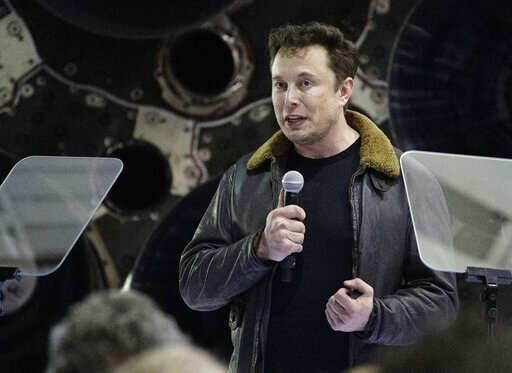 Elon Musk has put himself in legal trouble with a post on Twitter. Again.
Elon Musk has put himself in legal trouble with a post on Twitter. Again.The Securities and Exchange Commission on Monday asked a federal court to hold Musk, chief executive of Tesla, in contempt of court for violating a settlement that he and the company reached with the commission last year. The SEC said Musk issued an updated production outlook in a Twitter post Feb. 19 without first seeking approval from the company’s lawyers as required under the agreement.
It was the latest in a series of episodes, including the one that led to the settlement, that have renewed questions about Musk’s judgement and the Tesla board’s ability to oversee his actions.
The commission sued Musk and Tesla last year over a Twitter post in which he said he had “funding secured” to take the company private at $420 a share. It turned out that the plan to take the company private was in a much more embryonic state than his tweet indicated.
The settlement required the company to establish “mandatory procedures to oversee and preapprove Musk’s Tesla-related written communications” that might have material information. Musk was required to step down as chairman, and he and the company paid $20 million each in fines. The board named one of its members as chairwoman and appointed two new independent directors.
At the crux of the commission’s latest complaint are Musk’s recent production claims.
In the Feb. 19 post, Musk forecast that the electric-car company would make “around 500,000” cars in 2019, a big increase from a target of 400,000 set at the end of January. About four hours later, Musk corrected himself, saying Tesla would indeed deliver 400,000 cars this year. “Meant to say annualised production rate at end of 2019 probably around 500k,” he wrote.
Tesla’s lawyers acknowledged in a letter to the SEC on Friday that Musk’s tweets had not been reviewed before they were posted. They argued that he had believed that “the substance” of his post “had already been appropriately vetted, pre-approved and publicly disseminated.”
In the fourth-quarter earnings report released Jan. 30, Tesla said it was “targeting annualised Model 3 output in excess of 500,000 units sometime between Q4 of 2019 and Q2 of 2020.”
But in a motion filed Monday with U.S. District Court in Manhattan, the SEC said Musk had “violated the court’s final judgement by engaging in the very conduct that the pre-approval provision of the final judgement was designed to prevent.” It added that Musk’s tweet about producing 500,000 cars this year “was inaccurate and disseminated to over 24 million people” — the number of followers Musk had on Twitter at the time.
Musk defended himself on Twitter later Monday. He said the SEC “forgot to read Tesla earnings transcript,” in which he forecast production of between 350,000 and 500,000 cars. “How embarrassing,” he wrote.
Rebecca Roiphe, a professor at New York Law School, said the commission’s action “is a fairly extreme step, but it is unsurprising, given that Musk seems so unconcerned not only about the agreement but about the policies behind the securities law.”
“This is not an innocuous tweet,” she added. “Insiders have to be careful about revealing misleading information to the public.”
Roiphe said the motion could set the stage for the commission to later seek Musk’s removal as chief executive if he further violated the agreement. The court could also decide to impose a fine, which is typical in civil cases such as this, or impose other restrictions on Musk’s use of Twitter and other social media.
The SEC said in its motion that Musk had previously “not made a diligent or good faith effort to comply” with the settlement. The commission cited an interview that Musk gave to the CBS News program “60 Minutes,” broadcast in December, in which he said he did not respect the SEC and acknowledged that he did not have all his tweets reviewed.
“Well, I guess we might make some mistakes,” he said in the interview. “Who knows?”
Earlier, in October, Musk mocked the SEC on Twitter, calling it the Shortseller Enrichment Commission. He has long railed against hedge funds and other investors that bet that Tesla’s stock would decline by selling its shares short.
The day after Musk’s tweets about the company’s production goals appeared last week, Tesla’s general counsel, Dane Butswinkas, left the company. He had been in the job just two months and had previously represented Musk in the settlement negotiations with the SEC.
It is not clear whether Musk’s tweets played any role in that departure. The company said Butswinkas had decided to return to his law firm, Williams & Connolly, in Washington.
Tesla is also grappling with several other challenges. This week it is scheduled to pay bondholders $920 million, a sum that would consume about a third of its cash.
At the same time, the quality of Tesla’s Model 3 has come under scrutiny. Last week Consumer Reports dropped the Model 3 from its recommended list after readers reported cracked windows, chipped paint and problems with the car’s large touch screen.
Tesla sales also appear to be slowing. InsideEVs, an online publication that follows Tesla closely, estimated that the company sold only 6,500 cars in January, down from nearly 30,000 a month in the fourth quarter of last year.
The company’s stock was down more than 3 per cent in extended trading after the SEC filed its motion in court.